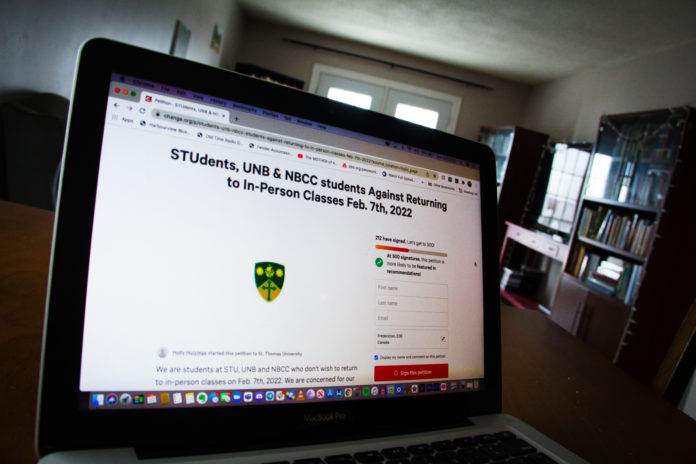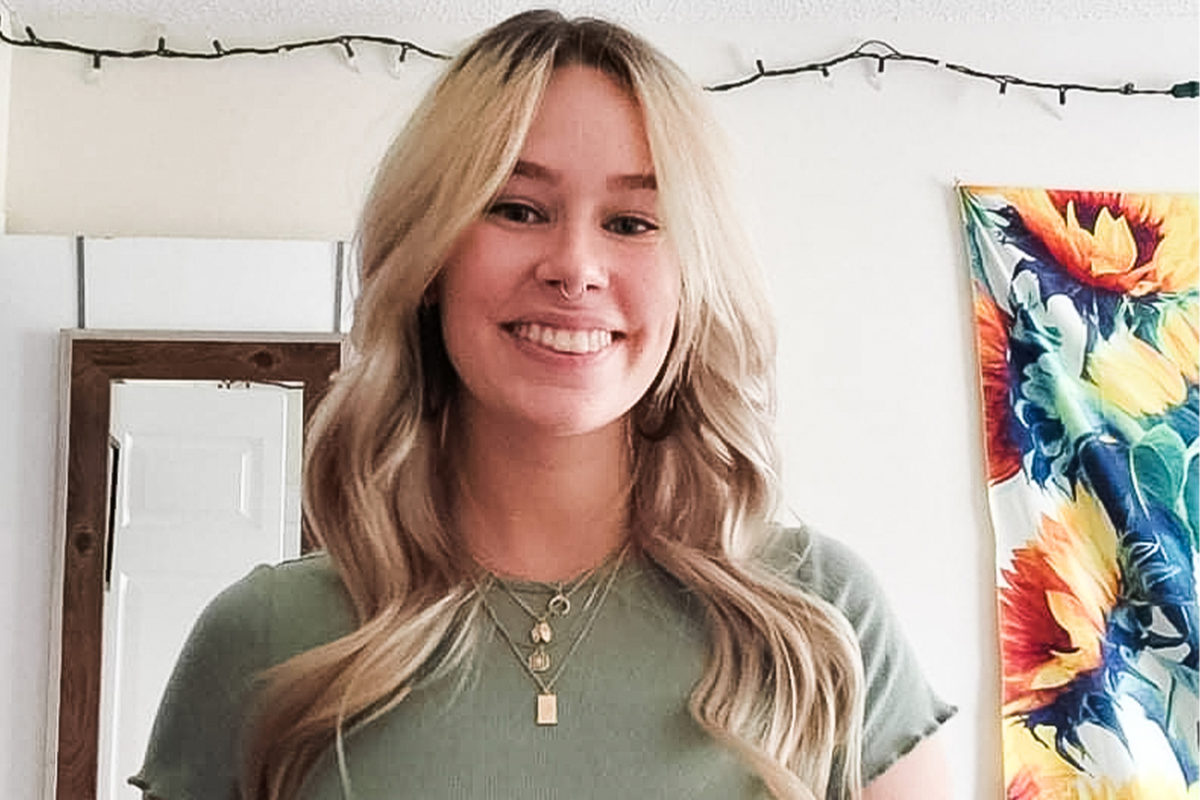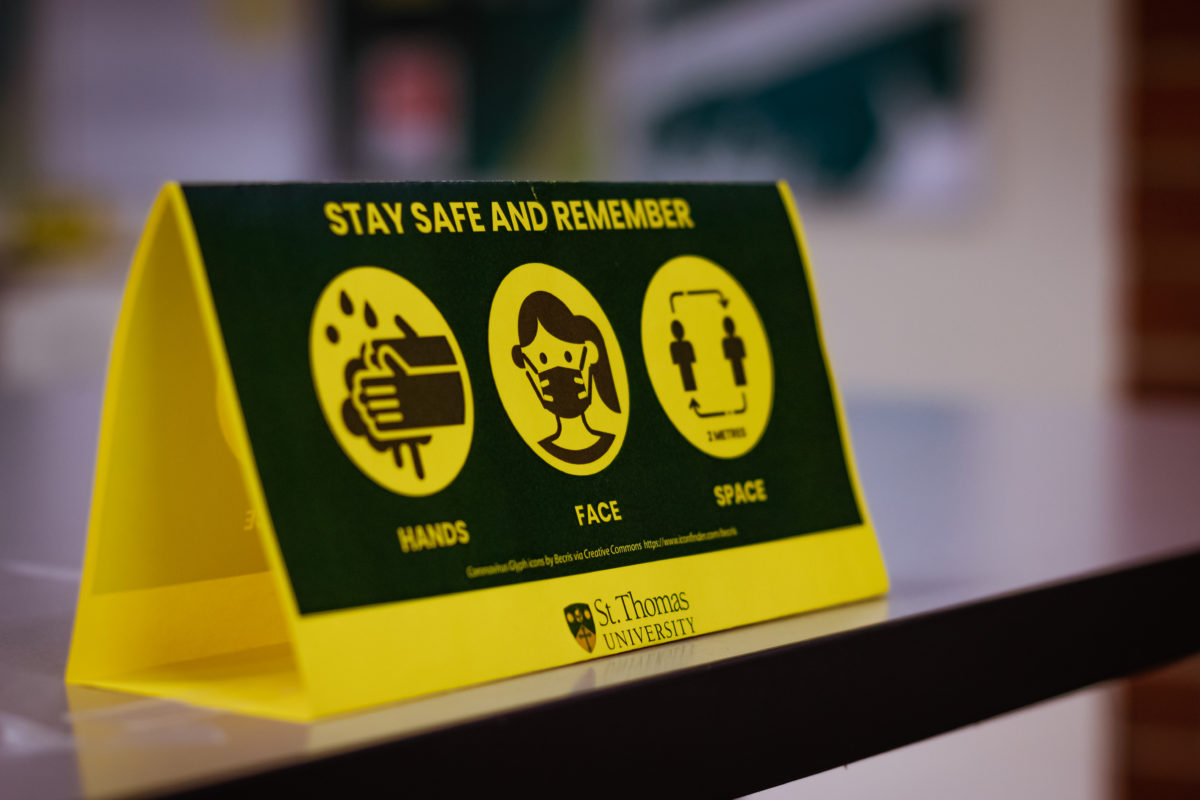

Molly Reid sat at her desk watching an asynchronous lecture when she heard the familiar ding of her Outlook email.
It was an email from St. Thomas University informing students that since the province of New Brunswick was moving back to Level 2 of the COVID-19 winter plan, in-person classes would officially start on Feb. 7.
Reid, a third-year STU student, immediately felt concerned due to the uncertainty of going back to campus. Going back in-person would mean she would have to leave her family’s home and move back into her double room in Harrington Hall.
“I think the back and forth is tough, keeping track of and worrying because we’re already a month into school and we’re starting to get used to online classes again,” she said.

Reid messaged a Facebook group chat asking if other students saw the email and also felt concerned to go back in-person. Another student in the group sent her a petition advocating against the return of in-person classes, which Reid chose to sign.
“I personally signed the petition because I am tired of the uncertainty,” said Reid.
The petition was created by a second-year mature student, Holly Huizinga. She was not surprised when she received STU’s email on Jan. 27, announcing the return to in-person classes. At the time of publication, the petition had around 215 signatures.
Before the fall semester, Huizinga applied for the online learning accommodation because she realized she did better in her classes when she was able to do the work at her own pace online, but it took until last week to be approved for this accommodation.
“It was a really long, drawn-out process that both my mental health and grades suffered from,” she said.
When Huizinga applied for the online learning accommodation, she was denied since she didn’t fit the criteria. After this, she tried explaining to the university she has other accommodations through the accommodations office because she’s a mature student with disabilities.
Since her application did not get approved during the fall semester, she had three courses, with only one taught online.


Last year, she did well when classes were virtual – she received a high GPA and enjoyed doing the work from home, but since her fall semester was in-person, she ended up failing one class.
This semester, she’s taking two courses. One of her professors decided the course would be online permanently. Her second professor told her if she couldn’t do the class in-person when students went back then she should find a different course.
Last week after she got the online learning approval, she emailed this professor to inform them but has not received a response yet.
“Students shouldn’t need to have to decide to risk their health, both mental and physical, their money and their education so we can rush back into in-person learning,” she said.
Jeffrey Carleton, vice president of communications at STU, said the university was in contact with the STU Students’ Union about concerns it received from students. He said it’s not a surprise students are experiencing uncertainty around the return to in-person classes.
Carleton said STU noticed when the petition was launched.
“I think students would be surprised to learn that we’re having weekly meetings with the department of post-secondary education, training and labour and with public health,” he said. “At those calls, they update us on the mandatory order and changes coming and things [they’re] considering and issues they’re hearing.”
STU also has one-on-one meetings with public health. Carleton said these meetings are important because universities are subject to the mandatory order in the province, which determines Level 1, 2 or 3 and STU has requirements it is supposed to follow.


He said the university rolled out its announcement on Thursday as soon as it could to give students as much certainty and understanding of the situation as possible.
Carleton said the university will be reaching out to students next week to clarify some of these issues of uncertainty and communicate public health information to students.
All on-campus regulations are coming directly from public health and the campus community currently has a 99 per cent vaccination rate, he said.
For students looking to apply for the online learning accommodation, Carleton said students must have medical documentation related to COVID-19 to give them remote access to in-person classes.
“This is one of those circumstances where not everybody’s going to be happy or fully satisfied. We do pay attention when students email us and we do pay attention when students do petitions,” said Carleton.
Huizinga said the university has the technology and experience to do both in-person and online classes.
“I know that St. Thomas prides itself on its in-person experience [but] that’s just not our priorities as students in the current climate,” said Huizinga.
